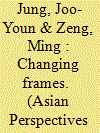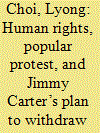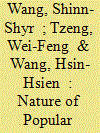|
|
|
Sort Order |
|
|
|
Items / Page
|
|
|
|
|
|
|
| Srl | Item |
| 1 |
ID:
186801


|
|
|
|
|
| Summary/Abstract |
In the People's Republic of China (PRC), the Chinese Communist Party (CCP) has remained stable despite frequent popular protests. Focusing on environmental protests, we attempt to explain how the CCP has utilized domestic news media to deal with protests and ensure regime stability. We chose five major protests against Para-Xylene (PX) and analyzed all of the People's Daily Online (PDO) articles thereon since 2007. From the Hu Jintao to Xi Jinping governments, PDO's collective portrayal of the anti-PX protests has dramatically changed from a symbol of democratic progress to an impediment to national industrialization and social stability. The systematically orchestrated media framing demonstrates that, instead of indiscriminately suppressing information on protests, the party has deliberately chosen when and what to permit and what images to project onto the protests. This article provides new insights into the CCP's media strategy for popular protest and sheds light on how China's authoritarian regime has maintained political legitimacy and social stability despite a considerable level of public discontent and deepening political oppression.
|
|
|
|
|
|
|
|
|
|
|
|
|
|
|
|
| 2 |
ID:
156348


|
|
|
|
|
| Summary/Abstract |
This article provides a detailed review of Jimmy Carter’s policy toward South Korea and the reaction from South Korea in the late 1970s based on recently declassified South Korean and American archival documents, newspapers, an interview with a former South Korean official, and the biography of South Korean president Park Chunghee. Jimmy Carter had a difficult time realizing his pledge to withdraw American ground troops from South Korea because of opposition from the U.S. Congress and insubordination among U.S. Army officials. Otherwise, Seoul did not disagree with the U.S. president in an ostensible manner. However, newly found evidence indicates that the South Korean leadership encouraged the split between the U.S. executive and legislature, the U.S. Army’s resistance toward its president, and criticism from Japan, another important diplomatic partner of Washington. This article highlights how various groups opposing American troop withdrawals undermined the president’s rationale for removing forces from South Korea.
|
|
|
|
|
|
|
|
|
|
|
|
|
|
|
|
| 3 |
ID:
180213


|
|
|
|
|
| Summary/Abstract |
The nexus between protest–transition–reform situated in a larger frame of Ethiopia’s political dynamics anchored in historical narratives and theoretical debates are presented in this paper. Moreover, the genesis and the dynamics surrounding the rolling out of the post-2018 Ethiopia’s transition are examined from the vantage point of prospects for entrenching a stable democratic dispensation in the country. To this end, the political economy approach, along with presenting ethnographic narratives that are pertinent to the subject under study, is used as an analytical lens. Also, document review of journal articles, official and academic reports, internet blogs, and newspaper and other media posts was undertaken to substantiate findings from primary sources. The paper concludes that the ongoing Ethiopian transition unfolded by paving avenues for opening up space for negotiating unsettled issues surrounding state-society relations in a context of a relatively liberalized political economy. However, the envisioned model of transition is constrained by different factors characterized by a split in the ranks of the ruling coalition, intergroup conflicts, and rising unmet expectations that resulted in the absence of peace and stability. Besides, the prevailing weakness of democratic institutions and polarized inter-ethnic relations, the recent outbreak of the COVID-19 pandemic stalled the progress of the transition process.
|
|
|
|
|
|
|
|
|
|
|
|
|
|
|
|
| 4 |
ID:
161405


|
|
|
|
|
| Summary/Abstract |
This article deals with the scandals that engulfed South Korea’s president, Park Geun-hye, in 2016–17 and the role of popular protest in how she, her confidante, and associated officials and business leaders were pursued, prosecuted, and jailed. The South Korean experience is located in a framework of integrity institutions and the 1986 exemplar of “people power” in the Philippines.
|
|
|
|
|
|
|
|
|
|
|
|
|
|
|
|
| 5 |
ID:
164807


|
|
|
|
|
| Summary/Abstract |
While China’s economic reforms have produced undeniably positive outcomes, a rapid increase in popular protests has become most striking in recent years. As protests grow steadily in both scale and frequency, the government continues to tout social stability as the chief concern of China today. These mounting tensions reflect a direct clash of horns between the maintenance of stability and the public’s desire to exercise their rights, frequently culminating in acts of repression by the Chinese state in order to quell the unrest. This raises an important question: how can the relationship between repression and popular protest in China be characterized? More specifically, which precise circumstances of popular protest elicit the employment of China’s repressive state capacity? Taking into account both theoretical perspectives and empirical analysis, this paper attempts to elucidate the issue by first collating a large body of data to clarify the precise characteristics of popular protest, then undertaking quantitative analysis to identify which factors trigger the mobilization of China’s machinery of repression. Furthermore, this study identifies that in recent years, the use of state repression has risen in parallel with an increasing emphasis on the principle of “maintaining social stability” in China.
|
|
|
|
|
|
|
|
|
|
|
|
|
|
|
|
|
|
|
|
|